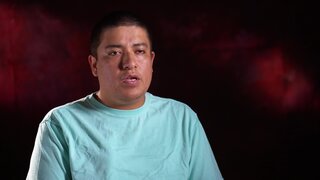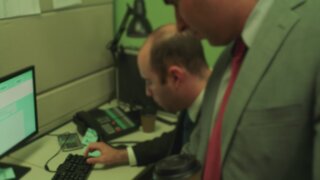Create a free profile to get unlimited access to exclusive videos, breaking news, sweepstakes, and more!
Romantic Drama Was At The Heart Of Beloved Taxi Driver’s Murder, Authorities Say
Rafael Hernandez-Torres was found shot to death in the trunk of a car partially submerged in an Oklahoma river.
The family of a beloved taxi driver from a close-knit Hispanic community in Oklahoma was rocked in the summer of 2015, due to an unspeakable crime born out of a terrible betrayal.
On the morning of May 1, 2015, a truck driver called 911 after spotting a vehicle partially submerged in the Caney River beneath a bridge. Authorities towed the car onto the riverbank — and the trunk popped open, revealing a deceased person inside. The victim was a Hispanic male who’d been shot in the chest several times.
“Somebody wanted to make sure that he did not survive his injuries,” Lt. Kyle Baker with the Roger County Sheriff’s Office told Oxygen’s “An Unexpected Killer,” airing Fridays at 8/7c on Oxygen.
Authorities began to look for clues in the car and at the scene. On the banks of the river, they found a bloody patch of grass and shell casings, suggesting that was where the victim had been shot before being placed in the trunk. Detectives also found a cellphone that had been left on the dashboard that thankfully had not been submerged in water and was still working.
As detectives continued collecting evidence, they were met on the scene by two men who said they’d seen the investigation on the news and recognized the car. It belonged to their brother, Rafael Hernandez-Torres. When detectives showed the men a photo of a tattoo on the victim’s body, they confirmed it was indeed him.
“It broke my heart. When I saw the pictures, it felt like the whole world just kinda ended,” one of Rafael’s brothers, Oscar Hernandez, told producers.
Rafael Hernandez-Torres was a taxi driver who worked in the Tulsa area. Born near Mexico City, he moved to the U.S. at the age of 20 with his parents and siblings. He turned his friendliness and love of travel into a taxi business, starting off with only one car. As the “big brother” of the family, it was up to him to help his parents support his brothers and sisters, who recalled how he always encouraged them to go to school.
“Rafael was a hard-working guy. He always tried to do better and better and better,” his sister, Barbara Hernandez, recalled.
Investigators spokes with Rafael’s family to try to retrace his steps before he was killed. His brother Oscar said Rafael called him recently to tell him he was traveling to Texas but then never called him again, which was unlike him. When asked for any possible motives for murder, Rafael’s brothers said Rafael was known to keep large quantities of cash in his car at all times. His brothers also said many people were jealous of Rafael’s success, and that some of the cars Rafael used for his taxi service had been vandalized recently.
It was valuable information for detectives.
“This was not a random killing. This is somebody who targeted Rafael and wanted him dead,” Baker said.
Authorities were able to gain access to Rafael’s phone records and learned he’d made multiple calls to different people between 9 p.m. and 9:30 p.m. on the night that he was killed. They were also able to trace one of the last phone calls to a woman named Letti, who worked in a laundromat near the shopping plaza where Rafael kept his cabs parked. His brothers suspected the two had a relationship; Rafael would often stop by the laundromat to bring her flowers and other little gifts. The only problem? Letti was actually married to another man.
“Now we’re thinking, this could be a motive,” Det. Wesley Jones with Roger County Sheriff’s Office told producers.
Investigators spoke with Letti and her husband, but both were eventually cleared of any suspicion.
Detectives found that one of the last people Rafael spoke to was a man who was supposed to get a ride from Rafael to Texas, only for Rafael to never show up. That man told police Rafael said he’d be late because a friend of his had gotten into an accident and needed a translator to speak with police for him.
Investigators suspected whoever had made the call likely knew Rafael and lured him to his death, but records showed that the phone in question was registered to a false name. So, they began calling the numbers the suspect had called, in the hopes of determining the owner of the phone. That effort led them to a man named Marco Lara, who’d had multiple calls with the owner of the phone and who also had an extensive criminal record involving drug and weapons charges.
After tracking down Lara's address, they staked out his home, which was located only a block away from the shopping plaza where Rafael usually spent his days. They soon observed a truck pulling into the driveway. Lara got out of the truck and detectives went up to the house. However, he was unwilling to interact with investigators and the situation soon turned into a standoff, with multiple authorities rushing to the scene to provide backup. Lara’s wife and children came out of the home, but it took several hours for Lara to come out and get taken into custody.
Back at the station, however, it became clear Lara wasn’t a suspect in Rafael’s killing. His cell phone records did not place him at the scene. He had refused to go into custody because he had an active warrant out and had simply been trying to avoid capture when he saw the authorities.
Still, he was able to finally point detectives to the owner of the phone: a man named Roman Medrano.
Detectives served a search warrant at the Medranos' Tulsa home. Inside, they found very little furniture, and yet Roman’s wife, Blanca, had $2,000 in her purse — the exact amount of money Rafael had in his car the night he was murdered.
At the station, Roman and Blanca denied any involvement in Rafael’s murder and claimed they’d been at home that night. But while both initially denied having interacted with Rafael at all, Blanca eventually admitted to having gotten rides from Rafael before. On one such occasion, he’d made advances toward her and she’d told her husband about it. Roman, who was known for being jealous, was incensed, Blanca claimed.
Blanca’s admission piqued the interest of investigators.
“We believed that Rafael’s conduct toward Roman’s wife could have been a motive to kill him,” Jones said.
When confronted, Roman denied any involvement in Rafael’s killing, despite records showing his phone had indeed been at the crime scene. DNA testing also tied Roman to the scene via a beer bottle found in the grass near the river. Authorities felt confident they’d found the killer, but they were worried that they didn’t have enough evidence to prove it to a jury. Their concerns were only heightened when they were dealt another curveball. Further DNA testing showed that another person had been at the scene on the night Rafael was killed. Those fingerprints belonged to a man named Adan Moras, a local ice cream seller.
Authorities were able to track Moras all the way to Detroit, Michigan, where he’d fled early on during the investigation. Once taken into custody, Moras denied being near the crime scene on the night of the murder.
After hearing news of the arrest, Roman met with police again and claimed he’d only been giving Moras a ride that night and was dragged into what happened next. Upon hearing about Roman’s allegations, Moras then decided to tell his own version of events: Roman had owed him money and had told Moras that if he came with him, he would be able to get his money back. The two men stopped to buy a case of beer and then Roman drove them to the riverbank, Moras alleged.
It was Roman who’d called Rafael that night, he insisted. Rafael had gone to the scene because he thought Roman needed his help speaking to police after an accident. They all drank a few beers together before Roman asked Rafael for help jump-starting his car. At Roman’s instructions, Moras went to hook up the jumper cables, only to hear gunshots. Moras then turned around to see Roman standing over Rafael’s body, he claimed.
Investigators were left to figure out who was telling the truth. Who had actually killed Rafael – Roman or Moras? A polygraph test confirmed it: It was Moras who was telling the truth. He helped Roman get rid of Rafael’s body out of fear Roman would shoot him next, he claimed, and he fled the area afterward.
Prosecutors charged Adan Moras as an accessory to murder and he was sentenced to 15 years in prison. Roman Medrano, meanwhile pleaded no contest to first-degree murder and was given life in prison with the possibility of parole. The end of the case was a relief for Rafael’s loved ones.
“My whole family felt relieved because we finally got justice for my brother Rafael, 'cause his death wasn’t in vain,” Oscar Hernandez said.
For more on this case and others like it, watch “An Unexpected Killer” airing Fridays at 8/7c on Oxygen or stream episodes any time on Oxygen.com.
























